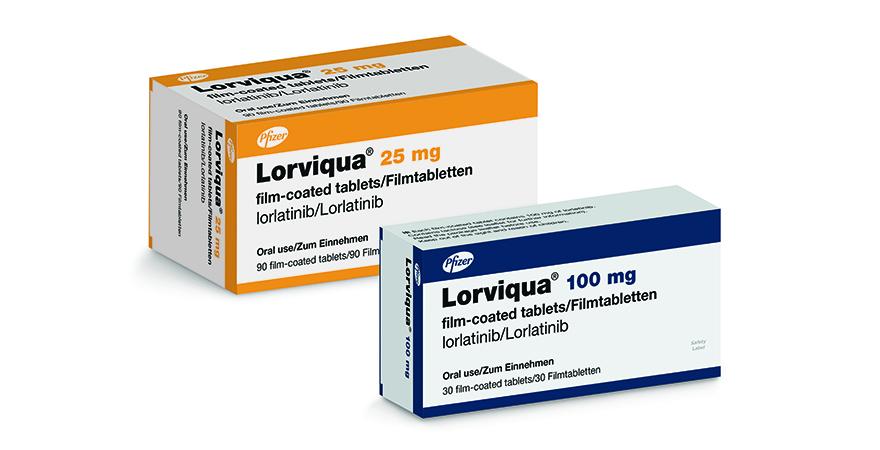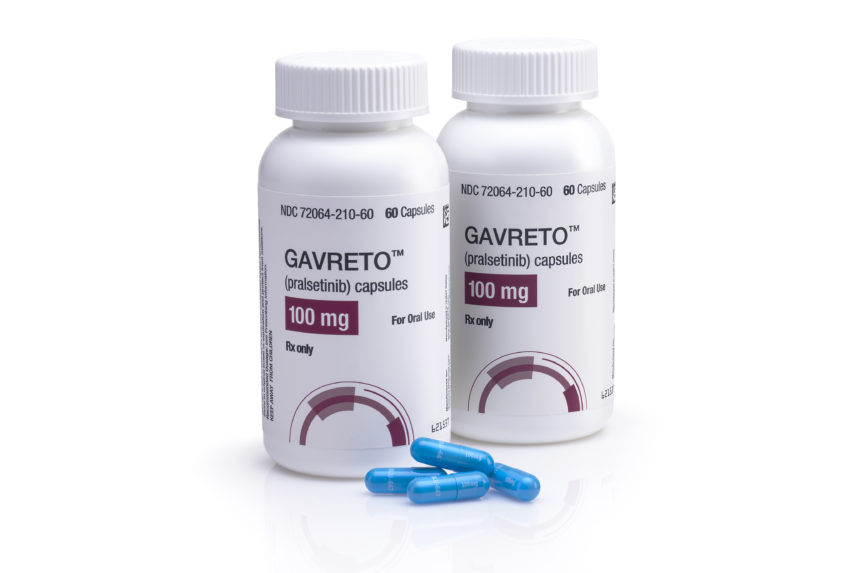Lorviqua (lorlatinib) vs Gavreto (pralsetinib)
Lorviqua (lorlatinib) vs Gavreto (pralsetinib)
Lorviqua (lorlatinib) and Gavreto (pralsetinib) are both targeted therapies used to treat certain types of non-small cell lung cancer (NSCLC), but they are designed to target different genetic alterations. Lorviqua is an ALK inhibitor indicated for patients with ALK-positive metastatic NSCLC, particularly effective in those who have progressed on prior ALK inhibitors. In contrast, Gavreto is a RET inhibitor, suitable for patients with NSCLC that is RET fusion-positive, and it is also used in the treatment of thyroid cancers with RET alterations. The choice between these medications would depend on the specific genetic mutations present in a patient's cancer, as determined by molecular testing.
Difference between Lorviqua and Gavreto
| Metric | Lorviqua (lorlatinib) | Gavreto (pralsetinib) |
|---|---|---|
| Generic name | lorlatinib | pralsetinib |
| Indications | ALK-positive metastatic non-small cell lung cancer (NSCLC) | RET fusion-positive non-small cell lung cancer (NSCLC), RET-mutant medullary thyroid cancer (MTC), and RET fusion-positive thyroid cancer |
| Mechanism of action | ALK and ROS1 tyrosine kinase inhibitor | RET kinase inhibitor |
| Brand names | Lorbrena | Gavreto |
| Administrative route | Oral | Oral |
| Side effects | Edema, peripheral neuropathy, cognitive effects, dyspnea, fatigue | Hypertension, hepatotoxicity, hemorrhagic events, constipation, musculoskeletal pain |
| Contraindications | Hypersensitivity to lorlatinib | Hypersensitivity to pralsetinib |
| Drug class | Tyrosine kinase inhibitor | Tyrosine kinase inhibitor |
| Manufacturer | Pfizer | Blueprint Medicines Corporation in collaboration with Genentech (Roche) |
Efficacy
Lorviqua (lorlatinib) for Lung Cancer
Lorviqua, known generically as lorlatinib, is a medication approved for the treatment of certain types of non-small cell lung cancer (NSCLC). Specifically, it is indicated for patients with anaplastic lymphoma kinase (ALK)-positive metastatic NSCLC who have progressed on crizotinib and at least one other ALK inhibitor for metastatic disease or whose disease has progressed on alectinib or ceritinib as the first ALK inhibitor therapy for metastatic disease. Lorlatinib is a third-generation ALK tyrosine kinase inhibitor (TKI) that has shown high efficacy in penetrating the blood-brain barrier, making it particularly useful in treating brain metastases, a common complication of NSCLC.
Clinical trials have demonstrated the efficacy of Lorviqua in patients with ALK-positive NSCLC. In a phase 2 trial, lorlatinib showed substantial systemic and intracranial activity in patients with ALK-positive NSCLC who had failed previous ALK inhibitors. The overall response rate (ORR) in this study was significant, with many patients achieving partial or complete responses. Furthermore, Lorviqua has been shown to be effective in patients with ALK mutations that confer resistance to other ALK inhibitors, highlighting its role in later lines of therapy.
Gavreto (pralsetinib) for Lung Cancer
Gavreto, with the generic name pralsetinib, is another targeted therapy approved for the treatment of NSCLC. It is specifically indicated for adult patients with metastatic RET fusion-positive NSCLC. Pralsetinib is a selective and potent RET kinase inhibitor that has shown significant efficacy in treating RET-driven cancers, including those with central nervous system involvement. The approval of Gavreto was based on the results of clinical trials that demonstrated robust and durable responses in patients with RET fusion-positive NSCLC.
In pivotal clinical trials, Gavreto displayed a high ORR in patients with RET fusion-positive NSCLC, including those who were previously treated and treatment-naïve. The duration of response (DOR) was also notable, with many patients experiencing prolonged disease control. The efficacy of Gavreto in the central nervous system was also evaluated, and the data suggested that it could provide intracranial benefits. This is particularly important given that lung cancer patients are at risk for brain metastases, which can significantly impact quality of life and overall prognosis.
Regulatory Agency Approvals
Lorviqua
-
European Medical Agency (EMA), European Union

-
Food and Drug Administration (FDA), USA

-
Health Canada

-
Therapeutic Goods Administration (TGA), Australia

Gavreto
-
European Medical Agency (EMA), European Union

-
Food and Drug Administration (FDA), USA

Access Lorviqua or Gavreto today
If Lorviqua or Gavreto are not approved or available in your country (e.g. due to supply issues), you can access them via Everyone.org.
How it works

Make an enquiry
Choose the medicine you want to buy, answer a couple of questions, and upload your prescription to speed things up. We’ll get back to you within 24 hours.


Make an enquiry
Choose the medicine you want to buy, answer a couple of questions, and upload your prescription to speed things up. We’ll get back to you within 24 hours.


Breeze through the paperwork
We'll guide you through the required documents for importing unapproved medicine, ensuring you have all the necessary information.


Get a personalized quote
We’ll prepare a quote for you, including medicine costs and any shipping, administrative, or import fees that may apply.


Receive your medicine
Accept the quote and we’ll handle the rest - sourcing and safely delivering your medicine.

Some text on this page has been automatically generated. Speak to your physician before you start a new treatment or medication.
Let's talk
If you have any questions, call us or send us a message through WhatsApp or email:
Contact us




